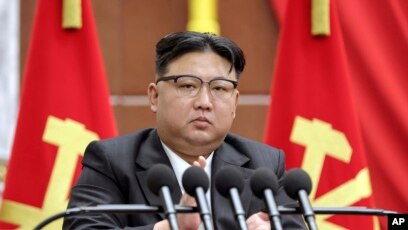William Gallo
At the beginning of the year, as western Japan reeled from an earthquake that killed more than 200 people and damaged tens of thousands of homes, North Korean leader Kim Jong Un sent Japanese Prime Minister Fumio Kishida a message of “sympathy and condolences.”
Kim’s message, published in North Korea’s main newspaper, was brief and in many ways unextraordinary. However, it was also unusually conciliatory, given that the two countries have no formal ties and that North Korean state media propagandists regularly lob fiery insults at Japanese leaders. More than a month later, North Korea is now giving more hints that it may be willing to improve relations with Japan, although many analysts are skeptical that will happen.
In a statement late Thursday, Kim Yo Jong, the powerful sister of North Korea’s leader, cautiously praised the “positive” statements of Kishida, who last week told Japanese lawmakers it is “extremely important” that he take the initiative to build top-level ties with Pyongyang. “I think there would be no reason not to appreciate his recent speech as a positive one, if it was prompted by his real intention to boldly free himself from the past fetters and promote the DPRK-Japan relations,” Kim said, using an abbreviation for Democratic People’s Republic of Korea, North Korea’s official name. Kim, who insisted the comments reflect only her “personal view,” also seemed to refer to Kishida’s oft-stated desire to hold a summit with her brother. However, she said, a Kishida visit to Pyongyang would only be possible if Japan stopped objecting to North Korea’s nuclear and missile programs and does not raise the “already settled” issue of North Korea’s abductions of Japanese nationals. Japan may find it difficult to accept those conditions. On Friday, Yoshimasa Hayashi, the Japanese government’s top spokesperson, would not say how Tokyo views Kim’s comments, but he said Japan cannot accept that the abduction issue has been resolved.
“We remain unchanged – Japan intends to comprehensively resolve pending issues, such as nuclear and missiles and the abductions,” Hayashi told reporters. The abduction issue has for decades been a barrier to improving Japan-North Korea relations. Japan says North Korea abducted 17 Japanese citizens as part of efforts to train its spies in Japanese language and culture in the 1970s and ’80s. North Korea has only ever admitted to kidnapping 13 Japanese nationals. In 2002, North Korea issued an apology and returned five of those who had been abducted, while claiming the others had already died. Many in Japan continue to believe that some of the victims of the effort are still alive. Public opinion polls consistently suggest the abduction issue is a top priority for Japanese voters, Jeffrey J. Hall, a Japanese politics specialist at the Kanda University of International Studies, said. “Almost every single Japanese conservative politician wears blue label pins on a daily basis to signal their belief that the abductee issue is extremely important and has not been adequately resolved,” Hall told VOA. “Kishida cannot simply sidestep the issue and hold a bilateral summit that only focuses on other issues,” he added. Any progress on the abductions issue could provide Kishida a much-needed boost. The approval rating for his Cabinet is just 25%, according to a recent poll by public broadcaster NHK, amid economic woes and a ruling party scandal related to political funds.
However, very few analysts predict Tokyo and Pyongyang will find a path forward – in large part because former North Korean leader Kim Jong Il, father of Kim Jong Un, declared the abductions issue resolved. “It’s very hard for the administration in North Korea to go back on that,” said Christopher Green, a Korea specialist and assistant professor at Leiden University in the Netherlands. “As we can see in Kim Yo Jong’s statement, the North Koreans are already setting out their stall clearly, saying that the abductions issue must not be central, because it has already been dealt with,” Green added. North Korea, though, may still find it worthwhile to engage Japan because it may believe it can “force open some cracks” in the recently expanded trilateral cooperation among the United States, Japan, and South Korea, according to Green. “If by some very unlikely turn of events the long-standing issues in their bilateral relationship can be resolved, so much the better. If not, well they still caused angst between Tokyo and Seoul, and Pyongyang will find a way to blame the perfidious Japanese for the failure. It is a win-win for the North; or at least there is no chance of Pyongyang losing,” he added. Under conservative President Yoon Suk Yeol, South Korea has pursued closer relations and defense ties with Japan, Korea’s former colonial ruler.
However, the convergence among South Korea, Japan, and the United States remains fragile, reflecting lingering differences over shared history and US political volatility, according to Robert Ward, senior fellow for Japanese security studies at the International Institute for Strategic Studies in London. “Kishida will be mindful to keep both Seoul and Washington abreast of developments with Pyongyang to reduce the risk of undesirable surprises,” Ward told VOA. “Kishida will be visiting Seoul in March and Washington in April – these would be important signalers of alignment between the three, particularly if a Kishida-Kim meeting goes ahead,” Ward added. So far, there are no public signs of tension in the trilateral relationship. Jung Pak, a senior US State Department official, told reporters Thursday that Washington supports Japan’s attempts to engage North Korea. South Korea and Japan are also “closely communicating” on the issue of North Korea and any future dialogue with Pyongyang, according to a South Korean official at the Ministry of Foreign Affairs who was quoted Friday by South Korea’s Yonhap news agency. Any contact between Japan and North Korea should be made in a way that would “help promote the peace and stability of the Korean Peninsula,” the South Korean official was quoted as saying.
VOA







